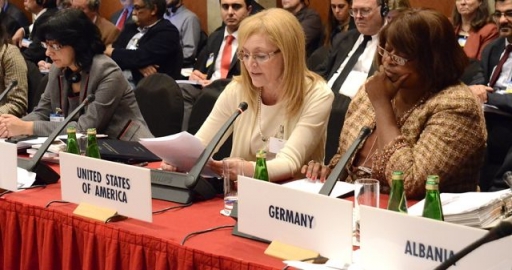US Representatives at Human Dimension Implementation Meeting in Warsaw

The 2012 Human Dimension Implementation Meeting (HDIM), Europe’s largest annual human rights and democracy conference, took place in Warsaw from 24 September through 5 October 2012. HDIM is organized every year by the OSCE Office for Democratic Institutions and Human Rights (ODIHR) as a platform for OSCE participating States, Partners for Co-operation, civil society, international organizations and OSCE structures to take stock of the implementation of the human dimension commitments, discuss associated challenges, share good practices and make recommendations for further improvements. On 2 October a group of participants met to discuss the needs of religious belief communities.
Among the assertions of this group was that religious and belief communities need legal recognition and should be granted quick, simple and non-discriminatory access to legal personality. Representatives of civil society and religious communities at the meeting noted that in the 1975 Helsinki Document, all participating States committed themselves to “recognize and respect the freedom of the individual to profess and practice, alone or in community with others, religion or belief”.
“Although this means that religious or belief communities are not obliged to seek official recognition for their activities, they do often need recognition of their legal personality as a practical matter: to be able to open bank accounts, enter into contractual obligations and purchase real estate, for example,” said Robert-Jan Uhl, ODIHR’s Adviser on Freedom of Religion or Belief.
“They may also need recognition of their legal personality in order to receive certain privileges, such as tax exemptions or state subsidies. Access to the legal status required to obtain such privileges should be granted in a non-discriminatory manner.”
During the meeting participants also discussed ideas and suggestions for the forthcoming Guidelines on Recognition of Religious or Belief Communities. “The Guidelines will highlight international standards and good practices on how recognition can be used to enhance the freedom of religion or belief and not as a means to restrict the activities of religious or belief communities,” said W. Cole Durham, a member of ODIHR’s Advisory Panel of Experts on Freedom of Religion or Belief.
ODIHR will work with the Advisory Panel, as well as the Council of Europe’s Venice Commission, on the development of the Guidelines, which will update relevant sections of the Guidelines for Review of Legislation Pertaining to Religion or Belief, published by ODIHR and the Venice Commission in 2004.
In addition to Cole Durham of the International Center for Law and Religion Studies at Brigham Young University, others attending the Meeting from the United States included Chair of the United States Commission on International Religious Freedom Katrina Lantos Swett and US Ambassador-at-Large for International Religious Freedom Suzan Johnson Cook.